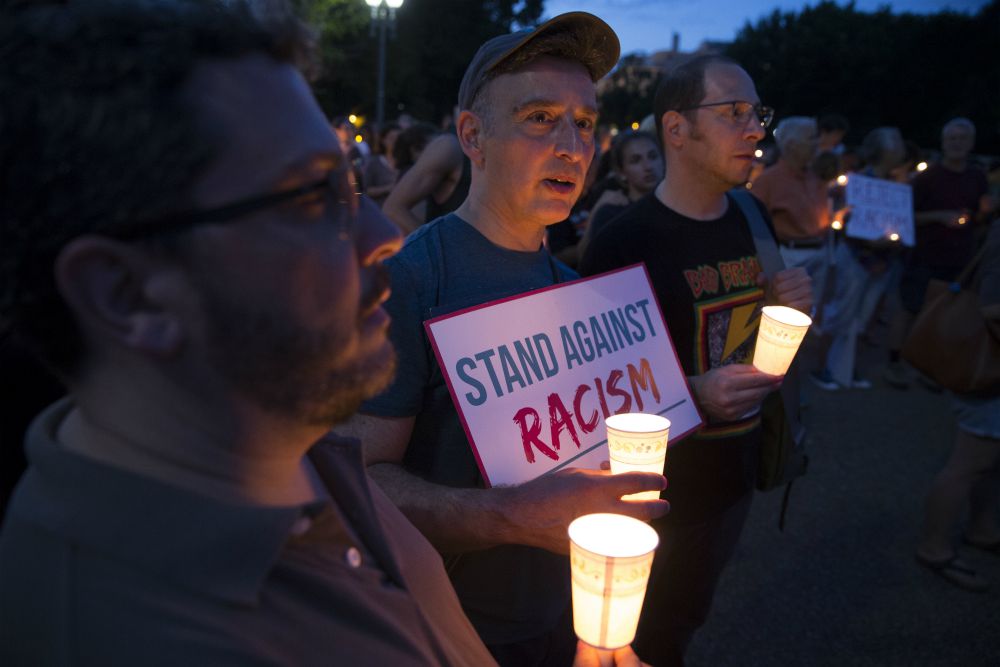
People participate in a candlelight vigil Aug. 13 outside the White House to show solidarity with the victims of violence that took place at a white nationalist rally in Charlottesville, Virginia. (CNS/EPA/Michael Reynolds)
Near the end of his April 4, 1963, "Letter From the Birmingham Jail," in which he stated that black citizens "have waited more than three hundred and forty years for our constitutional and God-given rights," Martin Luther King Jr. singled out for praise "the Catholic leaders of this state for integrating Springhill College." It was early in 1954, and days before the Brown v. Board of Education Supreme Court decision that banned segregation in public schools, that the Jesuit fathers and brothers of the small liberal arts school enrolled nine African American students to the Mobile, Alabama, campus. Founded in 1830, it was the state's oldest college.
For a decade, during which Gov. George Wallace vowed "segregation forever" and the Ku Klux Klan was terrorizing black neighborhoods in Mobile, Spring Hill was the only southern college to integrate. For 10 years, it had been putting into practice the reforms still to come in the 1964 Civil Rights Act.
The still current displays of hate and violence by the Klan in Charlottesville, Virginia, stoked memories of my student days at Spring Hill when I was an English major and philosophy minor from 1956 to 1960. It was on a night 60 years ago, in January 1957, halfway through my first year, that a convoy of white-robed Klansmen drove onto the campus. In front of the largest dormitory, they began erecting a kerosene-drenched cross on the lawn. Before they could set it afire, angry students emerged from their rooms to scare the scum away.
The Klan knights returned the following evening to try again, this time at the college's front gate on Old Shell Road. A hit-and-run job, they quickly fled as a cross burned. Days later at the same site, students hung in effigy a Klan grand wizard with words on its chest: "KKKers Are Chicken."
The lead story in the next issue of the school paper, The Springhillian, was headlined: "No Rest For the Wicked, Night Riders Visit Hill." The paper's editor-in-chief was Robert Buchanan, a black senior who had befriended me, a lowly freshman, by offering space for a weekly column.
Among the Jesuit faculty, none was more active or vocal in taking on the Klan than my sociology professor, Albert Foley. Born in 1912 to a Louisiana family, he entered the Jesuit order at 17 and was ordained in 1940. After earning a doctorate degree, he came to Spring Hill in 1953 where he would teach sociology until his passing in1990. Throughout the years, and at risk to his personal safety, he persistently denounced the Mobile Klan klavern publicly, whether he was taking out a full-page newspaper ad damning their deviltry or calling them "the dunce-cap and bed-sheet brigade."
Advertisement
At Spring Hill, Fr. Foley's classes were discussion-based, with all viewpoints welcomed. The sage priest knew that few of us had read black writers like Ralph Ellison, Richard Wright and James Baldwin. So he went slow. He understood that his students, whether southerners or northerners, might be tinged with racist leanings, of an uninformed kind he himself partly had while growing up in a domineering white society where a passive Catholic hierarchy sanctioned segregation at Sunday Mass, all-white parochial schools and hospital wards.
This was the Old South, still far from what would be called the New South. It was the intimidating south of the 1940s and '50s when the Klan's drive-by shootings, lynchings, bombings and arson were rampant and rarely prosecuted. It was before the civil rights movement of the 1960s became massive with Freedom Rides, marches and civil disobedience. It was when, in 1957, The Mobile Press could get away with running editorials titled "Scientist Finds Negroes Without Capacity To Learn" and "There Is Nothing Good About Integration."
A believer that experiential knowledge was superior to theoretical, Fr. Foley often took his students to the Mobile sites of Klan meetings, there to take down license plate numbers. He gave credits to students who infiltrated White Citizens Council meetings and wrote papers on their findings. He and his students issued a "Survey of Attitudes Toward the Ku Klux Klan as a Social Problem." Eighty-four percent of the 600 Mobilians interviewed saw the Klan "as more or less a grave threat to the well-being and peace of the community."
For his campaigning for racial justice, Fr. Foley found himself and his ardency scolded more than once by Mobile's Archbishop Thomas Toolen: back off, you're going too fast, you're divisive. In his memoirs, the Jesuit writes: "The chancellor of the diocese told me that I could go ahead and make a martyr of myself by defending the Negroes, but that I should not continue to endanger the rest of the clergy and laity by making the battle seem to be just a Catholic one."
In 1956, the same year that pressures against Fr. Foley increased, Fannie Motley became the first African-American graduate of Spring Hill College. She did so with honors and became a second grade teacher in Mobile County. Twelve years before her death in 2016 at 89, she returned to the college for an honorary degree in Humane Letters. In 2007, the school funded an annual scholarship in her name.
Martin Luther King Jr. once took time to visit and have dinner with Fannie Motley. Though she later moved several times, including to Cincinnati to earn a master's degree in guidance counseling from Xavier University, she faithfully took with her a prized possession on which she penned for the world to see: "Martin Luther King Jr. sat in this chair at my home October 10, 1964."
[Colman McCarthy Colman directs the Center for Teaching Peace, a Washington non-profit. He began writing for NCR in 1966, and his most recent book is Baseball Forever.]





